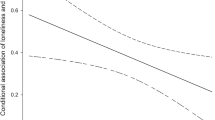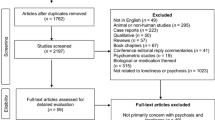Abstract
Introduction
Persons diagnosed with schizophrenia spectrum disorders (SSDs) often experience pervasive feelings of loneliness, which are considered a significant barrier to treatment and recovery.
Aim
As impaired social cognition may contribute to increased loneliness and less skillful social interactions, this study examines the relationships between loneliness and measures of social cognition and functional outcome from the Social Cognition Psychometric Evaluation (SCOPE) study.
Methods
This study evaluated the relationship between loneliness, social cognitive ability, and social functioning in the context of a large-scale psychometric investigation. We also explored the associations of select demographic characteristics and clinical variables on the endorsement of loneliness in persons diagnosed with a psychotic disorder.
Results
Seventy-four stable outpatients with SSDs and 58 healthy controls completed the UCLA Loneliness Scale in addition to the standard SCOPE battery. Our findings support prior research indicating persons diagnosed with a psychotic disorder experience greater levels of loneliness than normative groups. However, the results also indicate that self-reported loneliness is not associated with social cognitive abilities or functional outcome in psychosis. Regression analyses indicate that roughly half the variance in loneliness endorsed by persons with SSDs is accounted for by clinical variables, with loneliness most strongly associated with guilt and self-esteem.
Conclusion
These findings suggest that treatments aiming to reduce perceived social isolation in psychosis should incorporate techniques to bolster selfesteem, reduce guilt, and improve depressive symptoms.
Similar content being viewed by others
References
Cacioppo JT, Hawkley LC (2009) Perceived social isolation and cognition. Trends Cogn Sci 13(10):447–454
Giacco D, Palumbo C, Strappelli N, Catapano F, Priebe S (2016) Social contacts and loneliness in people with psychotic and mood disorders. Compr Psychiatry 66:59–66
Angell B, Test MA (2002) The relationship of clinical factors and environmental opportunities to social functioning in young adults with schizophrenia. Schizophr Bull 28(2):259–271
Cornwell EY, Waite LJ (2009) Measuring social isolation among older adults using multiple indicators from the NSHAP study. J Gerontol B Psychol Sci Soc Sci 64B:i38–i46
Masi CM, Chen HY, Hawkley LC, Cacioppo JT (2011) A meta-analysis of interventions to reduce loneliness. Pers Soc Psychol Rev 15(3):219–266
Peplau LA, Perlman D (1982) Perspectives on loneliness. Loneliness: a sourcebook of current theory, research and therapy. Wiley, New York, pp 1–20
Hawkley LC, Cacioppo JT (2010) Loneliness matters: a theoretical and empirical review of consequences and mechanisms. Ann Behav Med 40(2):218–227
Stain HJ, Galletly CA, Clark S, Wilson J, Killen EA, Anthes L, Harvey C et al (2012) Understanding the social costs of psychosis: the experience of adults affected by psychosis identified within the second Australian national survey of psychosis. Aust NZ J Psychiatry 46(9):879–889
Badcock JC, Shah S, Mackinnon A, Stain HJ, Galletly C, Jablensky A, Morgan VA (2015) Loneliness in psychotic disorders and its association with cognitive function and symptom profile. Schizophr Res 169(1–3):268–273
Morgan VA, Waterreus A, Carr V, Castle D, Cohen M, Harvey C, Jablensky A et al (2017) Responding to challenges for people with psychotic illness: updated evidence from the survey of high impact psychosis. Aust NZ J Psychiatry 51(2):124–140
Holt-Lunstad J, Smith T, Baker M, Harris T, Stephenson D (2015) Loneliness and social isolation as risk factors for mortality: a meta-analytic review. Perspect Psychol Sci 10(2):227–237
Meltzer H, Bebbington P, Dennis MS, Jenkins R, McManus S, Brugha TS (2013) Feelings of loneliness among adults with mental disorder. Soc Psychiatry Psychiatr Epidemiol 48(1):5–13
Shioda A, Tadaka E, Okochi A (2016) Loneliness and related factors among people with schizophrenia in Japan: a cross-sectional study. J Psychiatr Ment Health Nurs 23(6–7):399–408
Switaj P, Grygiel P, Ancwewska M, Wciorka J (2015) Experiences of discrimination and the feelings of loneliness in people with psychotic disorders: the mediating effects of self-esteem and support seeking. Compr Psychiatry 59:73–79
Thaipisuttikul P, Ittasakul P, Waleeprakhon P, Wisajun P, Jullagate S (2014) Psychiatric comorbidities in patients with major depressive disorder. Neuropsychiatr Dis Treat 10:2097–2103
Chrostek A, Grygiel P, Anczewska M, Wciórka J, Świtaj P (2016) The intensity and correlates of the feelings of loneliness in people with psychosis. Compr Psychiatry 70:190–199
Sündermann O, Onwumere J, Kane F, Morgan C, Kuipers E (2014) Social networks and support in first-episode psychosis: exploring the role of loneliness and anxiety. Soc Psychiatry Psychiatr Epidemiol 49(3):359–366
Switaj P, Grygiel P, Ancwewska M, Wciorka J (2013) Loneliness mediates the relationship between internalised stigma and depression among patients with psychotic disorders. Int J Soc Psychiatry 60(8):733–740
Trémeau F, Antonius D, Malaspina D, Goffa DC, Javitta DC (2016) Loneliness in schizophrenia and its possible correlates: an exploratory study. Psychiatr Res 246:211–217
Lim MH, Rodebaugh TL, Zyphur MJ, Gleeson JFM (2016) Loneliness over time: the crucial role of social anxiety. J Abnorm Psychol 125(5):620–630
Michalska da Rocha B, Rhodes S, Vasilopoulou E, Hutton P (2017) Loneliness in psychosis: a meta-analytical review. Schizophr Bull 44(1):114–125
Wesselmann E, Wirth J, Mroczek D, Williams K (2012) Dial a feeling: detecting moderation of affect decline during ostracism. Personal Individ Differ 53(5):580–586
Lim MH, Gleeson JFM, Alvarez-Jimenez M, Penn DL (2018) Loneliness in psychosis: a systematic review. Soc Psychiatry Psychiatr Epidemiol 53(3):221–238
Pinkham AE, Harvey PD, Penn DL (2018) Social cognition psychometric evaluation: results of the final validation study. Schizophr Bull 44(4):737–748
Sheehan DV, Lecrubier Y, Sheehan KH, Amorim P, Janavs J, Weiller E, Dunbar GC et al (1998) The Mini-International Neuropsychiatric Interview (M.I.N.I.): the development and validation of a structured diagnostic psychiatric interview for DSM-IV and ICD-10. J Clin Psychiatry 59(Suppl 20):22–33
First MB, Spitzer RL, Gibbon M, Williams JBW (2002) Structured clinical interview for DSM-IV-TR axis I disorders, research version, patient edition (SCID-I/P). Wiley, New York
Lim MH, Gleeson JF (2014) Social connectedness across the psychosis spectrum: current issues and future directions for interventions in loneliness. Front Psychiatry 5:154
Russell D, Peplau LA, Ferguson ML (1978) Developing a measure of loneliness. J Pers Assess 42:290–294
Bell M, Bryson G, Lysaker P (1997) Positive and negative affect recognition in schizophrenia: a comparison with substance abuse and normal control subjects. Psychiatry Res 73:73–82
Kohler CG, Turner TH, Bilker WB, Brensinger CM, Siegel SJ, Kanes SJ, Gur RE, Gur RC (2003) Facial emotion recognition in schizophrenia: intensity effects and error pattern. AM J Psychiatry 160(10):1768–1774
Baron-Cohen S, Wheelwright S, Hill J, Raste Y, Plumb I (2001) The ‘Reading the Mind in the Eyes’ Test revised version: a study with normal adults, and adults with Asperger syndrome or high-functioning autism. J Child Psychol Psychiatry 42(2):241–251
McDonald S, Flanagan S, Rollins J, Kinch J (2003) TASIT: a new clinical tool for assessing social perception after traumatic brain injury. J Head Trauma Rehabil 18(3):219–238
Corcoran R, Mercer G, Frith CD (1995) Schizophrenia, symptomatology and social inference: investigating “theory of mind” in people with schizophrenia. Schizophr Res 17(1):5–13
Bänziger T, Scherer KR, Hall JA, Rosenthal R (2011) Introducing the MiniPONS: a short multichannel version of the profile of nonverbal sensitivity (PONS). J Nonverbal Behav 35:189–204
Johannesen JK, Lurie JB, Fiszdon JM, Bell MD (2013) The social attribution task-multiple choice (SAT-MC): a psychometric and equivalence study of an alternate form. ISRN Psychiatry 2013:1–9
Mayer JD, Salovey P, Caruso DR, Sitarenios G (2003) Measuring emotional intelligence with the MSCEIT V.20. Emotion 3(1):97–105
Peyroux E, Strickland B, Tapiero I, Franck N (2014) The intentionality bias in schizophrenia. Psychiatry Res 219(3):426–430
Patterson TL, Moscona S, McKibbin CL, Davidson K, Jeste DV (2001) Social skills performance assessment among older patients with schizophrenia. Schizophr Res 48(2):351–360
Patterson TL, Moscona S, McKibbin C, Davidson K, Jeste DV (2001) Social skills performance assessment among older patients with schizophrenia. Schizophr Res 48(2–3):351–360
Mausbach BT, Harvey PD, Goldman SR, Jeste DV, Patterson TL (2007) Development of a brief scale of everyday functioning in persons with serious mental Illness. Schizophr Bull 33(6):1364–1372
Schneider LC, Struening EL (1983) SLOF: a behavioral rating scale for assessing the mentally ill. J Soc Work Res 19(3):9–21
Mausbach BT, Moore R, Bowie C, Cardenas V, Patterson TL (2009) A review of instruments for measuring functional recovery in those diagnosed with psychosis. Schizophr Bull 35(2):307–318
Weickert TW, Goldberg TE, Gold JM, Bigelow LB, Egan MF, Weinberger DR (2000) Cognitive impairments in patients with schizophrenia displaying preserved and compromised intellect. Arch Gen Psychiatry 57(9):907–913
Kay SR, Flszbein A, Opfer LA (1987) The Positive and Negative Syndrome Scale (PANSS) for schizophrenia. Schizophr Bull 13(2):261–276
Melo S, Corcoran R, Shryane N, Bentall RP (2009) The persecution and deservedness scale. Psychol Psychother 82(3):247–260
Beck AT, Steer RA, Brown GK (1996) BDI-II, beck depression inventory: manual, 2nd edn. Harcourt Brace, Boston
Hatton C, Haddock G, Taylor JL, Coldwell J, Crossley R, Peckham N (2005) The reliability and validity of general psychotic rating scales with people with mild and moderate intellectual disabilities: an empirical investigation. J Intellect Disabil Res 49(7):490–500
Wang YP, Gorenstein C (2013) Psychometric properties of the Beck Depression Inventory-II: a comprehensive review. Braz J Psychiatry 35(4):416–431
Rosenberg M (1965) Society and the adolescent self-image. Princeton University Press, Princeton
Tinakon W, Nahathai W (2012) Comparison of reliability and construct validity between the original and revised versions of the Rosenberg self-esteem scale. Psychiatry Investig 9(1):54–58
Okwaraji F, Onyebueke GC, Nduanya CU, Nwokpoku EN (2016) Gender differences, loneliness, self-esteem and depression in a sample of Nigerian university students. J Psychiatry Psychiatr Dis 1(1):26–37
Leung A, Chue P (2000) Sex differences in schizophrenia: a review of the literature. Acta Psychiatr Scand S401:3–38
Cacioppo JT, Hughes ME, Waite LJ, Hawkley LC, Thisted RA (2006) Loneliness as a specific risk factor for depressive symptoms: cross-sectional and longitudinal analyses. Psychol Aging 21(1):140–151
Beck AT, Alford BA (2009) Depression: causes and treatment, 2nd edn. Univ Pa Press, Baltimore
Ypsilanti A (2018) Lonely but avoidant—the unfortunate juxtaposition of loneliness and self-disgust. Nat Palgrave Commun 4(144):1–4
Pot-Kolder RMCA, Geraets CMW, Veling PW, van Beilen M, Staring ABP, Gijsman HJ, Delespaul PAEG, van der Gaag M (2018) Virtual-reality-based cognitive behavioural therapy versus waiting list control for paranoid ideation and social avoidance in patients with psychotic disorders: a single-blind randomised controlled trial. Lancet Psychiatr 5(3):217–226
Granholm E, Harvey PD (2018) Social skills training for negative symptoms of schizophrenia. Schizophr Bull 44(3):472–474
Lasgaard M (2007) Reliability and validity of the Danish version of the UCLA loneliness scale. Personal Individ Differ 42(7):1359–1366
Russell D, Peplau LA, Cutrona CE (1980) The revised UCLA loneliness scale: concurrent and discriminate validity evidence. J Pers Soc Psychol 39:472–480
Acknowledgements
This research was supported by Grant MH93432 to Drs. Harvey, Penn, and Pinkham from the National Institute of Mental Health. We would like to thank all individuals who participated in this investigation, including all research subjects and research assistants at the participating sites for their significant effort and contributions to the SCOPE study.
Author information
Authors and Affiliations
Corresponding author
Ethics declarations
Conflict of interest
Dr. Harvey has received consulting fees or travel reimbursements from Alkermes, Akili, Boehringer Ingelheim, Intra Cellular Therapies, Otsuka America, Sanofi Pharma, Sunovion Pharma, Takeda Pharma, and Teva Pharma during the past year. He has a research grant from Takeda and from the Stanley Medical Research Foundation. In the past 3 years, Dr. Jarskog has received research grant funding from NIH, Auspex/Teva, Boehringer-Ingelheim and Otsuka. The remaining authors declare that they have no conflict of interest pertinent to this study.
Rights and permissions
About this article
Cite this article
Ludwig, K.A., Nye, L.N., Simmons, G.L. et al. Correlates of loneliness among persons with psychotic disorders. Soc Psychiatry Psychiatr Epidemiol 55, 549–559 (2020). https://doi.org/10.1007/s00127-019-01789-5
Received:
Accepted:
Published:
Issue Date:
DOI: https://doi.org/10.1007/s00127-019-01789-5




